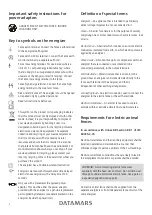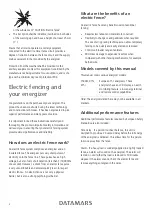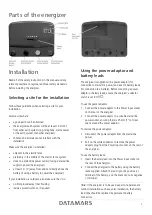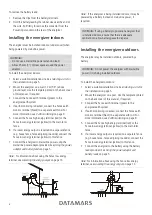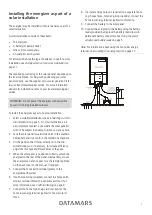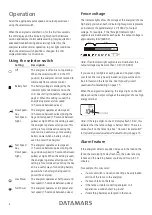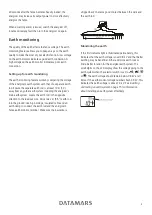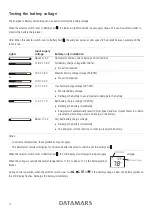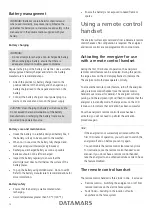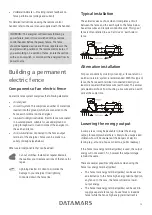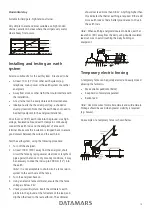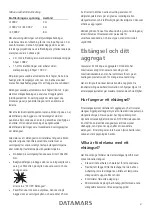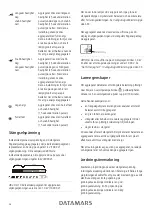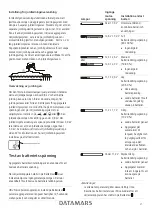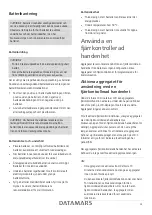
16
Frequently asked
questions/Troubleshoo
ting
What voltage is required to control animals?
4 kV is widely accepted as an adequate voltage to control
animals. However, you also require a well constructed fence
system to ensure that animals cannot push through
electrified wires.
The fence voltage is below 4 kV. How do I increase the voltage?
Check the energizer.
Ensure that the energizer is on and set
to operate at full power. Disconnect the fence wire from the
energizer's fence output terminal. Measure the voltage
across the energizer terminals using a Fault Finder, Digital
Voltmeter or a remote control handset. If the voltage is less
than 6 kV, the energizer may require servicing.
Check the energizer earthing.
Check that the earth monitor
voltage on the LCD display is below 0.8 kV, see
Earth
monitoring
on page 9.
Check the fence system for faults.
The most common source
of low voltage is faults on the fence line.
If the fence, earth and energizer are in good condition and
the voltage is still below 4 kV, talk to your nearest reseller.
Recent extensions to your fence, a poor fence layout, or soil
conditions may be causing inadequate voltage.
How do I locate faults?
The recommended tool for locating faults is a Fault Finder or
remote control handset. These have a combined voltage and
current meter which allows you to rapidly locate sources of
current leakage. Alternatively, use a Digital Voltmeter. Use
cut-out switches to turn off the power to different sections of
the farm. If the voltage on the fence increases when a
section of the farm is turned off, then investigate that section
for possible faults.
There are no lights flashing on the energizer
Ensure the power supply is on. Check the fence system for
faults (see above). Check the energizer (see above). If the
energizer still does not operate, it may require servicing.
The energizer does not respond to commands from the remote
control handset
See the Frequently Asked Questions/Troubleshooting section
in the remote control handset's user manual.
I want to disable the energizer's remote control feature
If you have a remote control handset, see the remote control
handset's user manual for instructions. If not, take the
energizer to an authorised service centre to have the feature
disabled.
Identifying faults using
the LCD display and
the indicator lights
If...
This means that...
The energizer is not
pulsing and the first
red Indicator light is
flashing...
The battery connections may be faulty.
Check all battery connections. Check the
battery voltage immediately using the
battery test setting. See
Testing the
battery voltage
on page 9.
The first red
Indicator light is
flashing and other
indicator lights are
on...
The energizer has a fault. If the display
persists and does not return to normal,
contact your service agent for advice.
The energizer is
pulsing slowly and
has a reduced
output voltage...
The battery voltage may be low and the
energizer has reverted to Slow Speed
and Low Output Power in order to
preserve the remaining power and
energy in the battery.
The warning light is
flashing and the
warning buzzer is
sounding…
The energizer has detected a sudden
increase in the load on the fence.
Switch the energizer off, locate and
remedy fault then turn the energizer on
again.
For example, this may occur:
•
if a cutout switch is closed,
connecting a heavily loaded section
of the fence to the energizer
•
if a branch falls on the fence
•
if the fence or cable connecting
energizer to it experiences a sudden
short to ground
•
if something becomes entangled in
the fence.
The output voltage
digits (large digits
on the LCD display)
flash 1.0 kV...
The fence voltage is below 1000 V.
There is a serious fault on the fence line.
See "How do I locate faults?" in
Frequently asked
questions/Troubleshooting
on page 15.

